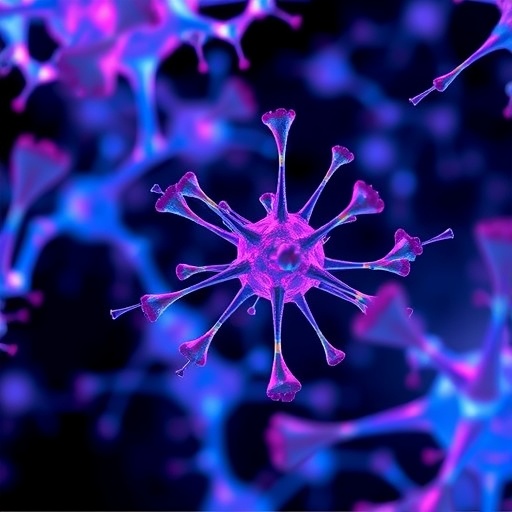In a groundbreaking initiative poised to reshape the therapeutic landscape for gastroenteropancreatic neuroendocrine tumors (GEP-NETs), researchers have launched the PReCedeNT trial—a phase III randomized-controlled study investigating the synergy of Lutetium-177 DOTATATE Peptide Receptor Radionuclide Therapy (PRRT) combined with chemotherapy. This ambitious trial targets a particularly elusive and aggressive subset of GEP-NETs characterized by FDG-avidity, a marker often associated with tumor heterogeneity and poorer clinical outcomes.
PRRT with Lutetium-177 DOTATATE has long held its place as the standard care for well-differentiated metastatic or locally advanced GEP-NETs, capitalizing on the overexpression of somatostatin receptors within these neoplasms. However, the efficacy of PRRT alone can be compromised in tumors exhibiting FDG-avidity, a metabolic profile signifying a more aggressive and heterogeneous phenotype. The PReCedeNT trial is designed to address this critical gap by evaluating whether the addition of a chemotherapy regimen—specifically capecitabine and temozolomide (CAPE-TEM)—can augment the therapeutic impact of PRRT.
This single-center, open-label phase III study plans to enroll a carefully selected cohort of patients with well-differentiated, FDG-avid GEP-NETs, randomizing them in equal proportion to receive either PRRT alone or PRRT in combination with CAPE-TEM chemotherapy. The primary endpoint centers on progression-free survival (PFS), with an ambitious target to improve outcomes by an absolute 15% over historical controls from the NETTER-1 trial, which previously established PRRT efficacy.
Secondary endpoints incorporate objective response rates, overall survival, toxicity profiles, and quality of life evaluations, acknowledging the multifaceted nature of cancer treatment success. These parameters will offer a panoramic view of the potential benefits and risks linked to integrating chemotherapy with radionuclide therapy, which, until now, has been largely explored in retrospective or small-scale studies without the robust evidence provided by randomized clinical trials.
The biological rationale for combining PRRT with CAPE-TEM lies in the complementary mechanisms of action. Lutetium-177 DOTATATE targets somatostatin receptor-positive tumor cells, delivering beta radiation that induces DNA damage and tumor cell death. Conversely, CAPE-TEM chemotherapy exerts cytotoxic effects, potentially eradicating tumor subpopulations that are functionally or metabolically distinct—specifically FKD-avid cells—that might evade PRRT. This dual-targeting strategy aspires to tackle tumor heterogeneity at its core.
Emerging evidence suggests that FDG-avid GEP-NETs, indicative of heightened glucose metabolism and aggressive biology, are less responsive to PRRT monotherapy, underpinning the need for enhanced treatment regimens. The PReCedeNT trial could therefore establish a new paradigm wherein the metabolic heterogeneity of tumors informs therapeutic combinations, personalizing treatment and improving prognosis.
Importantly, this trial’s methodology harnesses the rigor of randomization and control, providing high-quality data that can definitively ascertain the clinical benefit of PRRT plus chemotherapy. Enrolling 162 patients ensures adequate statistical power to detect meaningful differences in PFS while maintaining patient safety through careful monitoring of toxicity and adverse events.
The potential impact of the PReCedeNT trial extends beyond survival metrics. By integrating quality of life assessments, the study acknowledges that therapeutic gains must be balanced against patients’ well-being, an aspect fundamentally important in chronic cancer management. Capturing patient-reported outcomes will provide insights into tolerability and real-world implications of combining radionuclide therapy with cytotoxic agents.
Moreover, the trial’s comprehensive scope promises to unravel biological insights into tumor response dynamics, resistance mechanisms, and the interplay between metabolic activity and receptor expression in GEP-NETs. Such data could spur future innovations, including biomarker-driven treatment selection and novel combination therapies.
If successful, the PReCedeNT trial would set a precedent in neuroendocrine oncology, leveraging sophisticated molecular imaging and targeted therapies alongside systemic chemotherapy to confront tumor heterogeneity head-on. This approach exemplifies the evolution towards precision oncology, where treatment is both biologically rational and clinically substantiated.
The trial registration with recognized bodies—the Clinical Trials Registry of India and ClinicalTrials.gov—ensures transparency and facilitates global collaboration and data sharing, critical for accelerating advances in rare tumor types such as GEP-NETs.
Current treatment algorithms for GEP-NETs remain challenged by the diversity of tumor biology. The PReCedeNT trial offers a beacon of hope, potentially redefining standards where PRRT alone is insufficient. Its results will be closely watched by oncologists, nuclear medicine specialists, and researchers alike.
In conclusion, the PReCedeNT trial is a landmark endeavor addressing an unmet need in the management of FDG-avid, well-differentiated GEP-NETs. By evaluating the synergistic potential of Lutetium-177 DOTATATE PRRT combined with CAPE-TEM chemotherapy, this study aspires to enhance progression-free survival, improve overall outcomes, and elevate quality of life in a patient community hungry for better therapeutic options.
As data mature from this trial, the oncology community may be witnessing the dawn of a new combinational treatment era for neuroendocrine tumors, one that marries targeted radionuclide therapy with strategic chemotherapy to surmount biological complexity and deliver meaningful patient benefit.
Subject of Research: Combination therapy efficacy of Lutetium-177 DOTATATE PRRT plus CAPE-TEM chemotherapy versus PRRT alone in FDG-avid, well-differentiated gastroenteropancreatic neuroendocrine tumors.
Article Title: PReCedeNT trial: Phase III randomized-controlled trial of Lutetium − 177 DOTATATE Peptide Receptor Radionuclide Therapy (PRRT) plus Chemotherapy versus PRRT alone in FDG-avid, Well-differentiated Gastroenteropancreatic neuroendocrine tumors (GEP-NETs).
Article References:
Puranik, A.D., Dev, I.D., Yadav, S. et al. PReCedeNT trial: Phase III randomized-controlled trial of Lutetium − 177 DOTATATE Peptide Receptor Radionuclide Therapy (PRRT) plus Chemotherapy versus PRRT alone in FDG-avid, Well-differentiated Gastroenteropancreatic neuroendocrine tumors (GEP-NETs). BMC Cancer 25, 1659 (2025). https://doi.org/10.1186/s12885-025-15111-x
Image Credits: Scienmag.com




